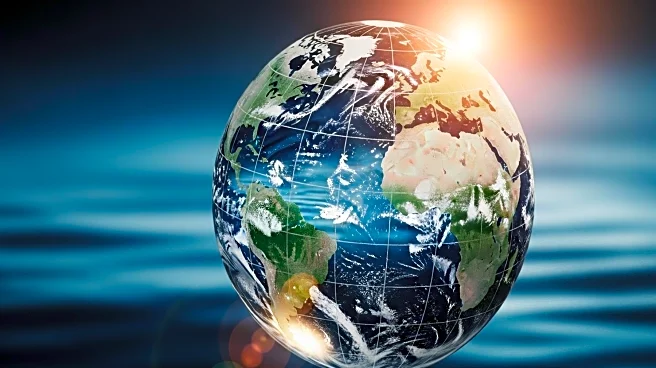What's Happening?
Recent research published in Nature Microbiology indicates that Prochlorococcus, the smallest and most abundant phytoplankton, may decline significantly as ocean temperatures rise. This bacterium is crucial for marine ecosystems, contributing to half of the ocean's photosynthesis and forming the base of the marine food web. The study predicts that Prochlorococcus populations could shrink by up to 50% in tropical oceans over the next 75 years if sea surface temperatures exceed 82 degrees Fahrenheit. The decline of this keystone species could lead to significant changes in marine biodiversity and food webs.
Why It's Important?
The potential decline of Prochlorococcus poses a threat to marine biodiversity and fisheries, impacting species that rely on this phytoplankton for food. As Prochlorococcus plays a vital role in producing oxygen and converting sunlight and carbon dioxide into food, its reduction could disrupt the balance of marine ecosystems. This development underscores the urgency of addressing climate change and reducing greenhouse gas emissions to prevent further ecological damage. The findings challenge previous assumptions that Prochlorococcus would thrive in warmer conditions, highlighting the need for more comprehensive environmental studies.
What's Next?
Researchers emphasize the need for immediate action to curb greenhouse gas emissions to mitigate the impact on marine ecosystems. The study's projections are conservative, not accounting for other ecological stressors like plastic pollution. Scientists hope the findings will draw attention to tropical oceans as potential natural laboratories for studying warming adaptations and early warning signals for ecological collapse. Continued research and monitoring are essential to understand the full impact of warming seas on marine life and to develop strategies for conservation.
Beyond the Headlines
The decline of Prochlorococcus could have broader implications for global climate regulation, as these organisms contribute significantly to the planet's oxygen production. The study highlights the interconnectedness of marine ecosystems and the potential cascading effects on global biodiversity. Ethical considerations arise regarding the responsibility to protect these vital organisms and the ecosystems they support. Long-term shifts in marine biodiversity could affect human industries reliant on ocean resources, necessitating adaptive strategies in fisheries and conservation efforts.









